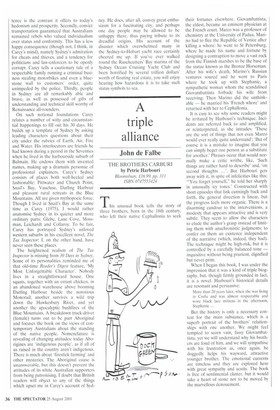A triple alliance
John de Falbe
THE BROTHERS CARBURI by Petrie Harbouri Bloomsbury, £16.99, pp. 311 ISBN 0747553424 This unusual book tells the story of three brothers, born in the 18th century, who left their native Cephallonia to seek
their fortunes elsewhere. Giovambattista, the eldest, became an eminent physician at the French court. Marco was a professor of chemistry at the University of Padua. Marino had to flee the Republic of Venice after killing a whore: he went to St Petersburg, where he made his name and fortune by designing a contraption to move a vast rock from the Finnish marshes to be the base of the statue known as the Bronze Horseman. After his wife's death, Marino's Russian ventures soured and he went to Paris where he took up with Stephanie, a sympathetic woman whom the scandalised Giovambattista forbade his wife from receiving. Then Marino did the unthinkable — he married his 'French whore' and returned with her to Cephallonia.
It is easy to see why some readers might be irritated by Harbouri's technique. Incidents are referred back to and amplified, or reinterpreted, as she intrudes: 'These are the sort of things that not even Marco would ever really quite understand'; 'But of course it is a mistake to imagine that you can simply beget one person as a substitute for another.' Phrases occur that would normally make a critic writhe, like, 'Such things are rather hard to describe' and, 'on second thoughts ... '. But Harbouri gets away with it, in spite of infelicities like this: —You forget yourself," he told her sharply in unusually icy tones.' Constructed with short episodes that link cunningly back and forth, the general direction is linear, but the progress feels more organic. There is a disarming candour to the interventions, a modesty that appears attractive and is very subtle. They seem to allow the characters to elude the author's grasp instead of limiting them with anachronistic judgments; to confer on them an existence independent of the narrative (which, indeed, they had). The technique might be high-risk, but it is controlled by a carefully balanced tone — inquisitive without being prurient, dignified but never prim.
When I began this book, I was under the impression that it was a kind of triple biography, but, though firmly grounded in fact, it is a novel. Harbouri's historical details are resonant and persuasive:
More than 20 years later, when she was living in Corfu and was almost respectable and wore black lace mittens in the afternoon, Stephanie ...
But the history is only a necessary context for the main substance, which is a superb portrait of the brothers' relationships with one another. We might feel tempted to scorn vain, fussy Giovambattista. yet we will understand why his brothers are fond of him, and we will sympathise with his frustration as, once again, he doggedly helps his wayward, attractive younger brother. The emotional currents are timeless and they are explored here with great sympathy and acuity. The book is free of sentimental clutter, but it would take a heart of stone not to be moved by the marvellous denouement.


























































 Previous page
Previous page